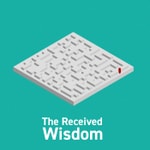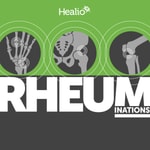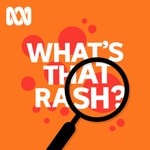The Received Wisdom - Shobita Parthasarathy – Détails, épisodes et analyse
Détails du podcast
Informations techniques et générales issues du flux RSS du podcast.

The Received Wisdom - Shobita Parthasarathy
Shobita Parthasarathy & Jack Stilgoe
Fréquence : 1 épisode/44j. Total Éps: 17

Classements récents
Dernières positions dans les classements Apple Podcasts et Spotify.
Apple Podcasts
🇬🇧 Grande Bretagne - socialSciences
08/07/2025#94🇬🇧 Grande Bretagne - socialSciences
07/07/2025#71🇬🇧 Grande Bretagne - socialSciences
06/07/2025#48🇩🇪 Allemagne - socialSciences
11/05/2025#97🇩🇪 Allemagne - socialSciences
10/05/2025#81🇬🇧 Grande Bretagne - socialSciences
09/05/2025#92🇩🇪 Allemagne - socialSciences
09/05/2025#59🇬🇧 Grande Bretagne - socialSciences
08/05/2025#74🇩🇪 Allemagne - socialSciences
08/05/2025#42🇬🇧 Grande Bretagne - socialSciences
07/05/2025#51
Spotify
Aucun classement récent disponible
Liens partagés entre épisodes et podcasts
Liens présents dans les descriptions d'épisodes et autres podcasts les utilisant également.
See allQualité et score du flux RSS
Évaluation technique de la qualité et de la structure du flux RSS.
See allScore global : 69%
Historique des publications
Répartition mensuelle des publications d'épisodes au fil des années.
Episode 39: The Politics of Air Pollution, Ozempic, and Luddism ft. Brian Merchant
Épisode 39
lundi 22 avril 2024 • Durée 01:11:06
Episode 39: The Politics of Air Pollution, Ozempic, and Luddism ft. Brian Merchant
In this episode, Shobita and Jack tackle the EPA's recent efforts to increase monitoring of air pollutants, Jack's new documentary on existential risks, and the Ozempic craze. And Jack chats with Brian Merchant, a freelance journalist who focuses on tech who recently wrote Blood in the machine: The origins of rebellion against big tech about the history of Luddism.
Links:
- Merchant, Brian. (2023) Blood in the machine: The origins of rebellion against big tech. Hatchette Book Group. New York.
- Brian Merchant’s Substack
- For UK listeners, an audio adaptation of Blood in the Machine on BBC Radio.
- Stilgoe, Jack (2024). How Real is the Existential Risk from AI? Analysis 4. BBC Radio.
Transcript and study questions available at thereceivedwisdom.org.
Episode 38: CRISPR therapies, Boeing, and reconnecting with Alondra Nelson
Épisode 38
vendredi 2 février 2024 • Durée 01:16:20
In the first episode of 2024, Shobita and Jack reflect on the first CRISPR therapy approved by drug regulators around the world, for sickle cell disease. We also talk about the safety issues plaguing Boeing, and the Post Office scandal roiling the UK and why it matters for regulating AI. And, we reconnect with Alondra Nelson, one of The Received Wisdom's first guests! Alondra Nelson is the Harold F. Linder Professor at the Institute for Advanced Study and previously as deputy assistant to President Joe Biden and acting director of the White House Office of Science and Technology Policy(OSTP).
References:
- Elish, M. (2019, March 23). Moral Crumple Zones: Cautionary Tales in Human-Robot Interaction. Engaging Science, Technology, and Society.
- Lazar, S and A. Nelson (2023, July 13). "AI safety on whose terms?" Science. 381 (6654): 138
- Zook, M, S. Barocas, d. boyd, K. Crawford, E. Keller, S. P. Gangadharan, A. Goodman, R. Hollander, B.A. Koenig, J. Metcalf, A. Narayanan, A. Nelson, and F. Pasquale (2017, March 30). "Ten simple rules for responsible big data research." PLOS Computational Biology.
- Nelson, A. (2016). The Social Life of DNA: Race, Reparations, and Reconciliation After the Genome. Beacon Press.
- Nelson, A, C. Marcum, J. Isler (2022, Fall). "Public Access to Advance Equity." Issues in Science and Technology.
- White House (2022, Oct 4). Blueprint for an AI Bill of Rights.
Episode 29: British Politics, the CHIPS and Science Act, and Rethinking the Green Revolution ft. Glenn Stone
Épisode 29
jeudi 3 novembre 2022 • Durée 59:13
Jack and Shobita chat about the disasters in British politics, the CHIPS and Science Act, and how to determine whether self-driving cars are safe. Plus we chat with anthropologist Glenn Davis Stone, Professor at Sweet Briar College and author of the recent book The Agricultural Dilemma: How Not to Feed the World. Stone argues that we've been learning the story of the Green Revolution all wrong, and this has huge implications for how we think about more recent agricultural technologies like fertilizer and genetically modified organisms.
Links related to the episode:Dan Reed and Darío Gil (2022). "Insufficient NSF funding could doom the Chips and Science Act." The Hill. October 13.Centre for Data Ethics and Innovation (2022). "Responsible Innovation in Self-Driving Vehicles."
Glenn Davis Stone (2022). The Agricultural Dilemma: How Not to Feed the World. Routledge.Glenn Davis Stone (2022). "Surveillance Agriculture and Peasant Autonomy." Journal of Agrarian Change.
Glenn Davis Stone (2020). "A Long-term Analysis of a Controversial GMO Crop." Nature Plants. March 13.Glenn Davis Stone (2020). "The Philippines has rated ‘Golden Rice’ safe, but farmers might not plant it." The Conversation. February 7.
Study Questions:
How is the CHIPS and Science Act being framed in the United States?
What are the problems with the conventional tale of the Green Revolution?
Why has the myth of the Green Revolution been so persistent?
What is the problem with GMOs, and specifically BT crops, in India?
How have publics gotten more involved in the decisions of the agricultural system? What are the impacts?
Episode 28: The Politics of Open Access, Alzheimer’s Research, and Ghost Work ft. Mary Gray
Épisode 28
mercredi 14 septembre 2022 • Durée 01:11:58
It's a new season of The Received Wisdom!! After their partial summer hiatus, Shobita and Jack discuss the fraud allegations that are rocking the foundations of what we know about Alzheimer's Disease, and the Biden Administration's directive to make freely available all publications based on federally funded research. And, they chat with Macarthur Fellow Mary Gray about the "ghost workers" behind digital technologies and supposedly artificial intelligence. Gray is Senior Principal Researcher at Microsoft Research, Faculty Associate at Harvard University’s Berkman Klein Center for Internet and Society, and faculty in the Luddy School of Informatics, Computing, and Engineering with affiliations in Anthropology and Gender Studies at Indiana University.
Relevant Links
- Charles Piller (2022). "Blots on a Field?" Science. July 21.
- The White House (2022). "Breakthroughs for All: Delivering Equitable Access to America’s Research." OSTP Blog. August 25.
- Mary L. Gray and Siddharth Suri (2019). Ghost Work: How to Stop Silicon Valley from Building a Global Underclass. Boston: Houghton Mifflin Harcourt.
- National Academies of Science, Engineering, and Medicine (2022). Fostering Responsible Computing Research: Foundations and Practices. Washington, DC: The National Academies Press.
- Mary L. Gray with Catherine Powell (2021). "The Emerging Technology Underclass." Council on Foreign Relations’ Women and Foreign Policy Roundtable Series and Roundtable Series on Cybersecurity and Cyberconflict.
- Margaret Bourdeaux, Mary L. Gray, and Barbara Grosz (2020). "How human-centered tech can beat COVID-19 through contact tracing." The Hill. April 20.
Study questions and full transcript available at thereceivedwisdom.org
Episode 27: How could self-driving cars change the world? - Part 2
Épisode 27
vendredi 15 juillet 2022 • Durée 30:40
This episode is the second of Jack’s investigations into self-driving cars. Last time, he was interested in Phoenix, Arizona. This time, he’s back home in London, an old, complicated, messy city with an extensive public transport system.
The episode was presented and written by Jack Stilgoe and edited by Gemma Milne, with research assistance from Nuzhah Miah.
Relevant links
- Joe Moran, (2006). Crossing the road in Britain, 1931–1976. The Historical Journal, 49 (2), 477-496.
- Joe Moran (2010). On roads: a hidden history. Profile Books.
- Lucy Suchman (1987). Plans and situated actions: The problem of human-machine communication. Cambridge university press.
- Peter Norton (2011). Fighting traffic: the dawn of the motor age in the American city. MIT Press.
- Peter Norton (2021). Autonorama: The Illusory Promise of High-tech Driving. Island Press.
- https://www.wayve.ai/ (and the company’s published papers, e.g.: Hawke, J., Badrinarayanan, V., & Kendall, A. (2021). Reimagining an autonomous vehicle. arXiv preprint arXiv:2108.05805).
- Chris Tennant, & Jack Stilgoe, (2021). The attachments of ‘autonomous’ vehicles. Social Studies of Science, 51(6), 846-870. https://journals.sagepub.com/doi/full/10.1177/03063127211038752
- Tennant, C., Neels, C., Parkhurst, G., Jones, P., Mirza, S., & Stilgoe, J. (2021). Code, culture and concrete: Self-Driving Vehicles and the Rules of the Road. Frontiers in Sustainable Cities, 122.
Transcript and study questions available at thereceivedwisdom.org.
Episode 26: How could self-driving cars change the world? - Part 1
Épisode 26
vendredi 10 juin 2022 • Durée 31:13
This month is a bit different. This episode is the first part of an investigation, led by Jack, into self-driving cars, trying to locate the technology in particular places. The first part focuses on Phoenix, Arizona, a testbed for some of the technology’s most ambitious developers and also the scene of the first self-driving car crash to kill a pedestrian. Jack talks to various experts - historians, crash investigators, journalists and tech company representatives - to ask what the technology might mean for different places. The second part moves to Jack’s home town, London.
The episode was presented and written by Jack Stilgoe and edited by Gemma Milne, with research assistance from Nuzhah Miah.
- Jack Stilgoe, (2019) Who Killed Elaine Herzberg?, OneZero, 12 Dec 2019, https://onezero.medium.com/who-killed-elaine-herzberg-ea01fb14fc5e
- Chris Tennant, & Jack Stilgoe, (2021). The attachments of ‘autonomous’ vehicles. Social Studies of Science, 51(6), 846-870. https://journals.sagepub.com/doi/full/10.1177/03063127211038752
- Lucy Suchman, (2019). Demystifying the intelligent machine. In Cyborg Futures (pp. 35-61). Palgrave Macmillan, Cham.https://link.springer.com/chapter/10.1007/978-3-030-21836-2_3
- Madeleine C Elish, (2019). Moral Crumple Zones: Cautionary Tales in Human-Robot Interaction. Engaging Science, Technology, and Society, 5, 40-60.
- Peter Norton, (2011). Fighting traffic: the dawn of the motor age in the American city. Mit Press.
- Wetmore, J. (2003). Driving the dream. The history and motivations behind 60 years of automated highway systems in America. Automotive History Review, 7, 4-19.
Full transcript and study questions available at thereceivedwisdom.org.
Episode 25: Science in Abortion Politics and the Failure of One Laptop Per Child ft. Morgan Ames
Saison 1 · Épisode 25
samedi 14 mai 2022 • Durée 01:07:10
This month, Shobita and Jack discuss how scientists are engaging in the boiling politics of abortion in the United States, the implications of large language models (a new type of artificial intelligence), and Elon Musk's possible takeover of Twitter. And we have a fascinating conversation with Morgan Ames about her award-winning book The Charisma Machine, which focuses on the global One Laptop Per Child project. Ames is Professor of Practice at the School of Information and Associate Director of Research for the Center for Science, Technology, Medicine and Society at the University of California, Berkeley.
- Morgan G. Ames (2019). The Charisma Machine: The Life, Death, and Legacy of One Laptop Per Child. MIT Press.
- Morgan G. Ames (2021). "Laptops alone can’t bridge the digital divide." MIT Technology Review. October 27.
- Morgan G. Ames (2019). "Future Generations will Suffer if we Don't Solve Unequal Access to Tech." Pacific Standard. April 2.
- Morgan G. Ames (2019). "The Smartest People in the Room? What Silicon Valley’s Supposed Obsession with Tech-Free Private Schools Really Tells Us." LA Review of Books. October 18.
- Roger A. Pielke Jr. (2007). The Honest Broker: Making Sense of Science in Policy and Politics. Cambridge University Press.
- Dan Sarewitz (2013). "Science must be seen to bridge the political divide." Nature. 493: 7.
- Johanna Okerlund, Evan Klasky, Aditya Middha, Sujin Kim, Hannah Rosenfeld, Molly Kleinman, Shobita Parthasarathy (2022). What’s in the Chatterbox? Large Language Models, Why They Matter, and What We Should Do About Them. Technology Assessment Project, Science, Technology, and Public Policy Project, University of Michigan.
- Richard Van Noorden (2022). "How language-generation AIs could transform science." Nature. April 28.
Study Questions:
1) What are the problems with scientists taking such a prominent role in the abortion debate, especially in the US?
2) What was the hope behind the One Laptop Per Child project, and how did it fail?
3) What biases lay underneath the One Laptop Per Child project, in the idea, the design, and the implementation?
4) What role does hype play in shaping our understanding of emerging technologies? What are its positive and negative dimensions?
5) Could a One Laptop Per Child-type project ever be successful? How?
Transcript available at thereceivedwisdom.org.
Episode 24: The TRIPS Patent Waiver and Communicating Science Differently ft. Sabrina McCormick
Saison 1 · Épisode 24
mercredi 23 mars 2022 • Durée 58:04
In this episode, Shobita and Jack discuss this uncertain moment in the pandemic around the world, including the latest negotiations related to the TRIPS patent waiver related to COVID vaccines. They consider emerging efforts to develop a "pangenome" that emphasizes human genetic diversity. And they chat with Professor Sabrina McCormick, a scholar, policymaker, and filmmaker, about her efforts to advocate for climate change action in creative ways.
Relevant links:
- Roxane Khamsi (2022). "A more-inclusive genome project aims to capture all of human diversity." Nature. 16 March.
- Sequestra film (2020).
- The Years of Living Dangerously film (2014).
- The Years of Living Dangerously, Bringing Climate to the Classroom (2016).
- www.resilienceentertainment.com
Full transcript and study questions available at thereceivedwisdom.org
Episode 23: The Myths of Genius, IP, and Surveillance ft. Chris Gilliard
Saison 1 · Épisode 23
mardi 15 février 2022 • Durée 01:02:38
This month, Jack and Shobita discuss the resignation of the Director of the White House Office of Science and Technology Policy, African scientists' success in copying the Moderna vaccine and the potential long-term implications, and the politics of long COVID. And we speak with scholar and writer Chris Gilliard about the rise of surveillance technologies, their implications especially for marginalized communities, and what we can do about it.
Related links:
- Chris Gilliard (2022). "Crime Prediction Keeps Society Stuck in the Past." WIRED. January 2.
- Chris Gilliard (2021). "A Black Woman Invented Home Security. Why Did It Go So Wrong?" WIRED. November 14.
- Chris Gilliard and David Golumbia (2021). "Luxury Surveillance." Real Life. July 6.
- Chris Gilliard (2020). "Caught in the Spotlight." Urban Omnibus. January 9.
- Chris Gilliard (2018). "Friction-Free Racism." Real Life. October 15.
- Will Oremus (2021). "A Detroit community college professor is fighting Silicon Valley’s surveillance machine. People are listening." The Washington Post. September 17.
- Alex Thompson (2022). "Biden’s top science adviser bullied and demeaned subordinates, according to White House investigation." Politico. February 7.
- Amy Maxmen (2022). "South African scientists copy Moderna’s COVID vaccine." Nature. February 3.
Study Questions:
1. Can you think of additional examples of luxury and imposed surveillance? What are their similarities and differences?
2. What are the limitations to the consent model for accessing digital technologies? What harms might it cause?
3. Think of a common digital technology that clearly produces social harm (e.g., Facebook, facial recognition technology). How might you redesign it to maximize the social benefits while limiting the harms?
4. How might governments regulate emerging digital technologies to maximize societal benefits?
Transcript available at thereceivedwisdom.org
Episode 22: Theranos, Medical Devices, and Indigenous Knowledge on Climate Change ft. Kyle Powys Whyte
Saison 1 · Épisode 22
mercredi 12 janvier 2022 • Durée 59:57
In this episode, Shobita and Jack discuss the recent conviction of the now-notorious Elizabeth Holmes, former CEO of Theranos, and what it means for tech hype. They talk about the UK government's recent decision to review the racial bias embedded in medical devices, and consider whether this will move equity objectives forward. And they speak with Kyle Powys Whyte, George Willis Pack Professor of Environment and Sustainability, and Affiliate Professor of Native American Studies and Philosophy, at the University of Michigan, about how indigenous knowledge can inform the science and policy discussions related to climate change.
Relevant Links:
- "An Interview with Kyle Whyte." Sense & Sustainability. September 1, 2021.
- Kyle Powys Whyte. "White Allies, Let's Be Honest About Decolonization." Yes! Magazine. April 3, 2018.
- Kyle Powys Whyte. "Five reasons why the North Dakota pipeline fight will continue in 2017." The Conversation. January 5, 2017.
- Kyle Powys Whyte. "Why the Native American pipeline resistance in North Dakota in about climate justice." The Conversation. September 16, 2016.
- Kyle Powys Whyte. "Michigan's woeful track record for environmental justice." Detroit Free Press. February 4, 2016.
Transcript available at thereceivedwisdom.org









